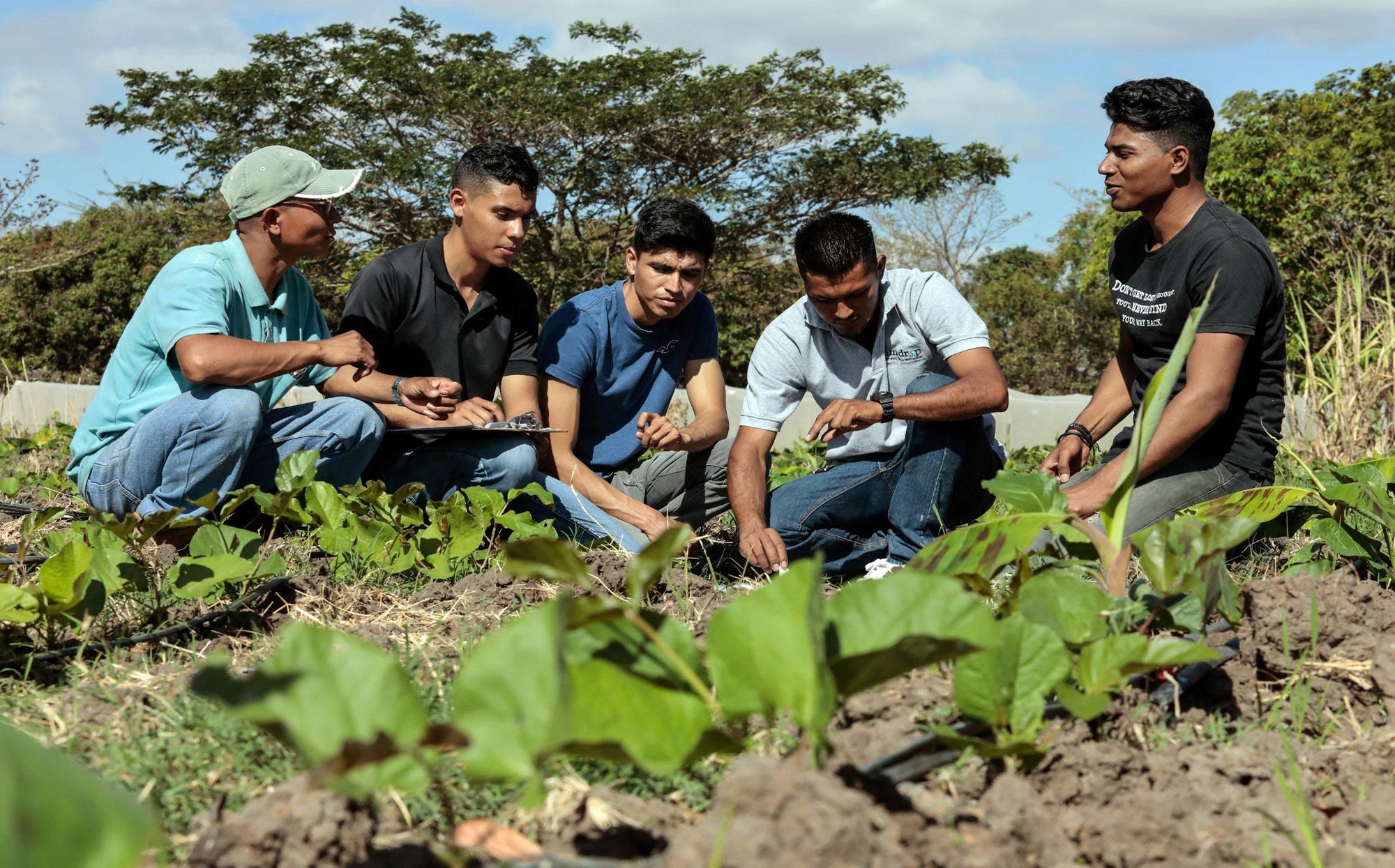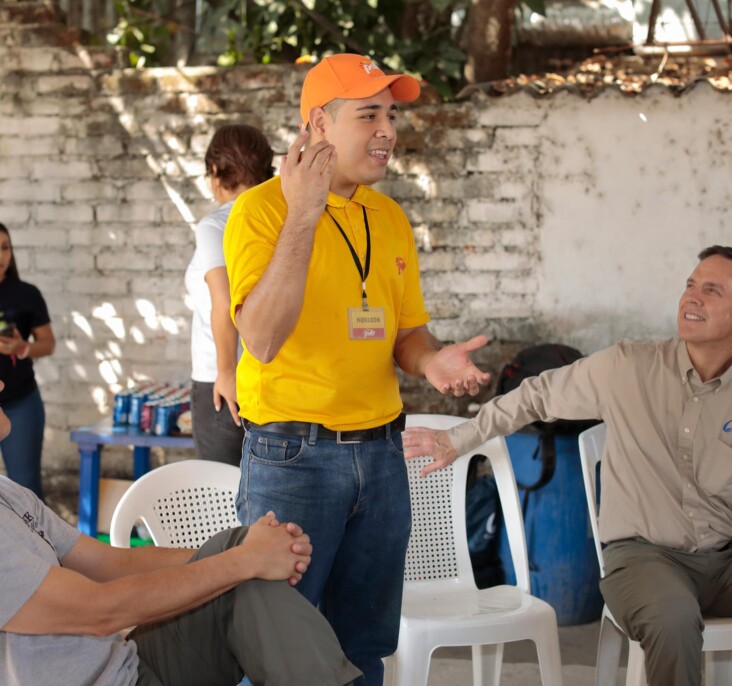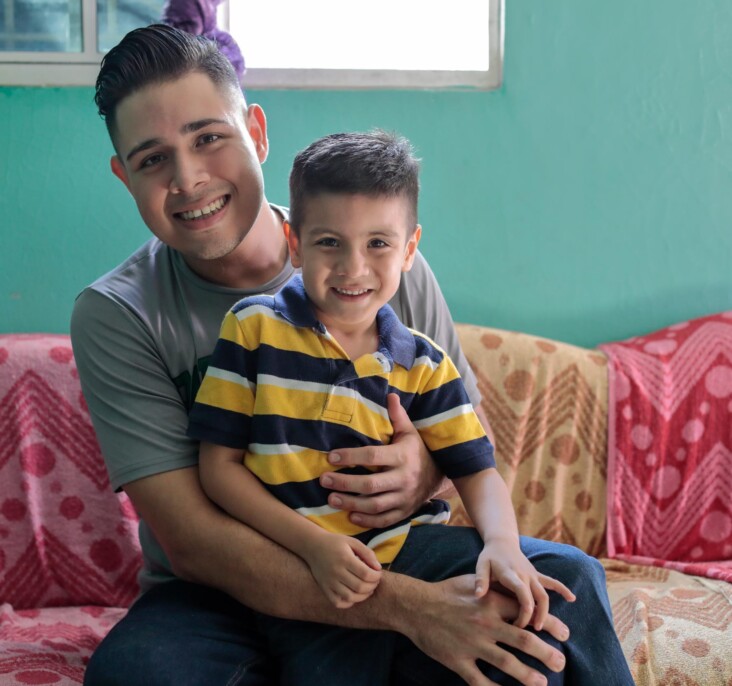Bayron Alejandro Cazún Castro wanted a career. He thought his best shot was to practice his English and eventually work in a call center. He had grown up in a family of farmers and loved being in nature, working with animals. But he had seen his loved ones struggle to make ends meet. He knew his country, El Salvador, faced crippling droughts and increasing levels of land degradation due to traditional farming techniques—those used by his own family. He saw little promise in agriculture.
CRS helped him see farming in a new light. With training in water-smart agriculture, Bayron learned to grow healthy crops while preserving valuable natural resources. Today, he is a leader in his community, seeking to transform this very traditional sector with modern, sustainable techniques. He works to show other young people that agriculture is a dependable, economically attractive pursuit, and to show all of El Salvador that young people deserve a chance.
“People don’t speak well of young people in El Salvador because of the crime,” he says. “But there is a great majority of young people who want to get ahead. They do want to do things well. They do feel the responsibility to work.”

Creating Opportunities
Young people are inheriting a world fraught with complex challenges. Many are out of school and unemployed, facing unrest and insecurity that make it difficult to imagine finding professional success. This generation must confront dangerous migration choices, terrorist organizations, gangs, political strife, changing climates and rapidly changing technology. These obstacles can make small gaps in education or employment into insurmountable roadblocks.
But we can reverse this trajectory. By giving young people the chance to train for and pursue a safe, productive future at home, we can break the chains of poverty. CRS and our partners are building on proven models and moving beyond localized programming to focus on entire regions. As part of our Vision 2030 strategy, we will accelerate and scale our reach from thousands of young people to millions, permanently revolutionizing the global youth sector. We will help disenfranchised youth envision and build brighter futures and to realize their capacity as a new generation of leaders.
“I believe that young people have a huge potential to develop,” says Iris Aviles, CRS El Salvador project officer. “I think it is only necessary to give them a little push so that they can develop, and, above all, someone to believe in them. That is what has been lacking.”
Competitive labor markets, evolving needs and the COVID-19 pandemic all limit the opportunities available to young people today. In many developing nations, federal governments allocate funding for workforce development programming. Disappointingly, those training programs are largely failing.
Skills training is the critical stepping stone for young people un- or underemployed around the world—from Central America to West Africa. That’s why CRS has decided to focus on workforce development to empower young people, scaling up our proven, comprehensive model, which includes life and technical skills, mentoring, and job placement. We will foster collaboration between governments, businesses and service organizations, improve vocational education centers and train 70,000 young people before placing them in jobs or back in school.
A New Mindset
Nidelson Murga, like Bayron, is building a life for himself in El Salvador. Nidelson is a 21-year-old father of two. He had been out of work for more than five months when his grandmother introduced him to CRS. Always his biggest supporter, Nidelson’s grandmother, Dora Alicia Paz de Perez, worried about the choices he was making. He argued with his mom and didn’t have his father’s support, financially or emotionally. “He carried such weight in his heart,” she says. He started using drugs and wound up in the hospital after an accident. Something had to give. That’s when Dora heard about CRS’ workforce development program at church. “Nidelson was the first one that crossed my mind,” she says.
Dora encouraged Nidelson to get involved. “I’m betting on you. I know you’ll get ahead,” she told him, and Nidelson followed her advice. He enrolled in YouthBuild, a CRS workforce development program that prepared him for both the job market and life broadly. “I learned various skills and virtues,” he says. “I learned what it means to be a family. They’re like a family to me.”
Nidelson enjoyed the unique dynamic of the program classroom, where coordinators were engaged in making learning fun. “I liked it as soon as I arrived. The outings we did gave us a lot of great opportunities,” he says. The biggest change though, for Nidelson, was an attitude shift. He no longer dreaded going to work. “The program taught me how to create a new mindset. You have to control your emotions and your feelings. Then, you can do whatever you set your mind to.”
Building Stronger Families
During his training process, Nidelson’s family became involved in another CRS program, which included psychosocial support to help family members overcome their differences and support one another.
“They told us we should become better friends with our children,” Dora says. “I wanted to support Nidelson so he saw I was also interested in his recovery. It has helped me to understand Nidelson a lot better. There was a phrase I really liked, ‘You can learn from your slip-ups.’ We have to support our children and tell them to keep on going, so they don’t feel like a failure.”
This program continued symbiotically alongside Nidelson’s training. All members of the family began to communicate more openly and express love for one another. Nidelson and his mother began having meaningful conversations instead of shouting matches. “He listens to her now,” Dora says. “He has improved a lot.” Nidelson agreed that now he understands his mom and feels she can put herself in his shoes. “I feel loved,” he says.
“Our ties have become stronger,” Nidelson says. “Now we’re more attached. My family and I are closer, thank God. When I face new problems, I don’t feel so overwhelmed anymore, because they have my back.” The benefits extended into Nidelson’s own parenting too. He spends his spare time at home now, playing with his children instead of wandering the streets. “Before, I would neglect them,” he says. “Now I understand that my children need me the same way I needed my parents. My father was never around. I don’t want to make the same mistakes he did. I want to be around.”
“The program was when my transformation began,” Nidelson says. “My attitude changed. My personality changed.” When Nidelson was preparing to apply for a job, he was ready. He cut his hair and kept a positive attitude as he headed to his first job interview. “The program had already fulfilled its purpose, everything depends on me now,” he told himself.
He got the job.
Support services for young men and women are failing. But CRS has a solution. By putting our faith into action, we will ensure young people like Bayron and Nidelson gain the holistic, market-driven support they need to thrive. In early 2020, Nidelson met with CRS staff and donors to exemplify the success of workforce development programming. He shined as he shared his story and embodied the promise of young people worldwide.
“If you want something, don’t let anybody tell you you can’t,” Nidelson says. He wants to send a message to other young people in challenging circumstances. “Give everything you’ve got to make it happen. You create your own destiny, and only you can decide if it works out or not.”

